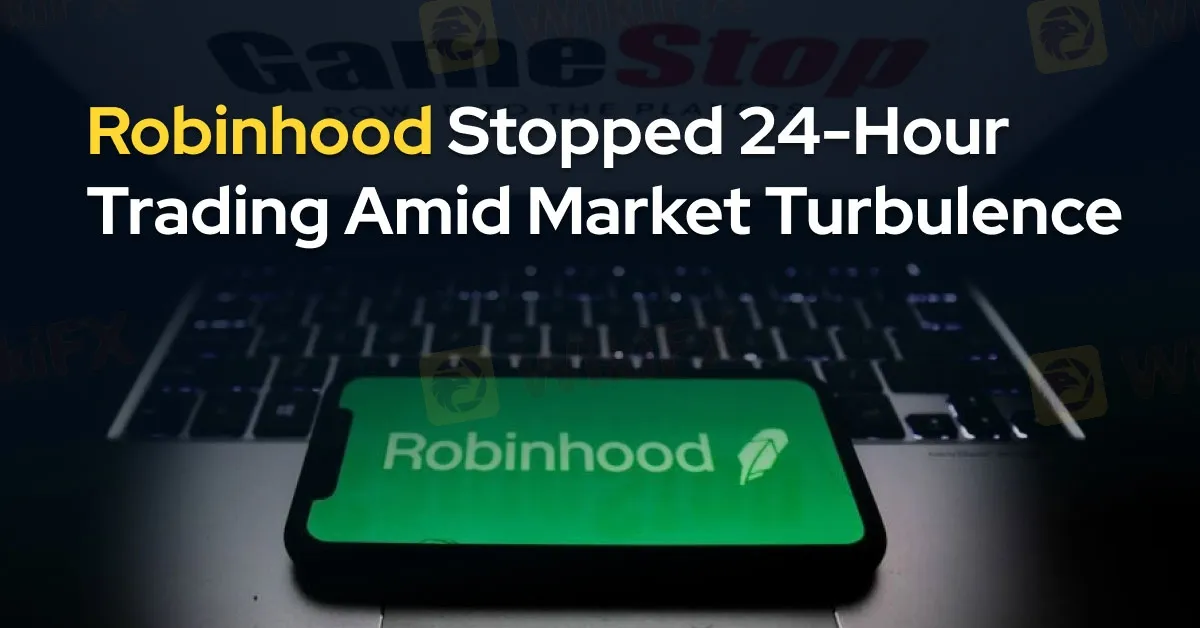简体中文
繁體中文
English
Pусский
日本語
ภาษาไทย
Tiếng Việt
Bahasa Indonesia
Español
हिन्दी
Filippiiniläinen
Français
Deutsch
Português
Türkçe
한국어
العربية
Robinhood Stopped 24-Hour Trading Amid Market Turbulence
abstrak:Robinhood announced the suspension of its 24-hour overnight trading service due to the severe market downturn on Monday, August 5.

Robinhood (NASDAQ:HOOD), a leading US neobroker, has announced the suspension of its 24-hour overnight trading service due to the severe market downturn on Monday, August 5. This service will be unavailable through Tuesday, August 6.
The market faced a steep decline on Monday, with the Dow Jones Industrial Average plummeting more than 1,000 points, a 2.6% drop. The broader S&P 500 and technology-heavy NASDAQ indices saw even sharper declines of 3.0% and 3.4%, respectively. Cryptocurrencies also took a hit, with Bitcoin and Ether prices dropping significantly.
In a statement on X (formerly Twitter), Robinhood explained that its overnight trading platform, Blue Ocean ATS (BOATs), would be offline for the night. Orders placed before approximately 8 PM ET will resume processing around 4 AM ET the following morning. Users can cancel their orders anytime and place new ones for the next trading session.

The market turmoil extended to Japan, where stocks experienced a dramatic 13% drop, the largest since the 2011 global financial crisis. This sharp sell-off led to circuit breakers being triggered across Asian exchanges. The Asia-Pacific index, excluding Japan, fell by 4.2%, while Japan's Nikkei 225 index hit a seven-month low.
In the United States, the negative trend continued with Nasdaq futures down 4.7% and S&P 500 futures plunging 12.4%. European markets were also affected, with EUROSTOXX 50 futures falling 2.1% and FTSE futures dropping 1.2%.
Investors turned to safer assets, causing both the yen and Swiss franc to strengthen. Japanese 10-year bond yields fell to 0.785%, the lowest since April, and U.S. Treasury yields also dropped significantly, with 10-year yields at 3.723% and two-year yields at 3.807%. This inversion of the yield curve is often seen as a recession indicator.
Following a disappointing July payrolls report, market expectations for Federal Reserve rate cuts have surged. Analysts now predict a 78% chance of a rate cut in September, with further reductions expected later in the year. Goldman Sachs has raised its recession probability to 25% under current conditions.
The U.S. dollar's appeal as a safe haven weakened, falling 0.4% against a basket of major currencies. It also declined against the yen and euro, while the Swiss franc appreciated. Gold prices climbed to $2,456 an ounce as investors sought refuge in precious metals.

Disclaimer:
Ang mga pananaw sa artikulong ito ay kumakatawan lamang sa mga personal na pananaw ng may-akda at hindi bumubuo ng payo sa pamumuhunan para sa platform na ito. Ang platform na ito ay hindi ginagarantiyahan ang kawastuhan, pagkakumpleto at pagiging maagap na impormasyon ng artikulo, o mananagot din para sa anumang pagkawala na sanhi ng paggamit o pag-asa ng impormasyon ng artikulo.
Broker ng WikiFX
Exchange Rate


